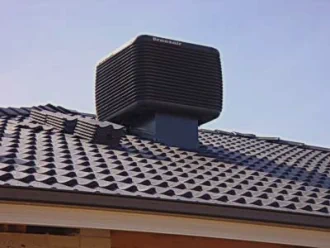Which Air Conditioning System to Choose During El Niños
Evaporative cooling systems, are an increasingly popular option for home air conditioning in areas with dry seasons, such as during El Niños.
These systems use evaporation to cool the air, rather than relying on refrigerants and compressors like traditional air conditioning units. In this blog post, we'll explore how evaporative cooling systems work, their benefits, and why they are a cost-effective and efficient option for home air conditioning.
How Evaporative Cooling Systems Work
Evaporative cooling systems work on a simple principle: as water evaporates, it absorbs heat from the surrounding air, causing the air to cool down. This is the same reason why you feel cooler when you step out of the shower or a swimming pool on a hot day. Evaporative cooling systems use this principle to cool the air in your home.
The basic components of an evaporative cooling system include a water reservoir, a pump to circulate the water, and a series of pads or filters through which air is forced to pass. As air is drawn through the pads or filters, water is evaporated, causing the air to cool down. The cooled air is then circulated throughout your home by a fan, providing a refreshing and comfortable indoor environment.
Benefits of Evaporative Cooling Systems
There are several benefits to using an evaporative cooling system in your home:
- Cost-effective: Evaporative cooling systems are generally less expensive to install and operate than traditional air conditioning units. They use less energy and require fewer maintenance and repair costs over time.
- Environmentally-friendly: Unlike traditional air conditioning units, evaporative cooling systems do not rely on harmful refrigerants or chemicals. They also use less energy, making them a greener option for home cooling.
- Effective in dry climates: Evaporative cooling systems work best in dry climates, where the air is not already saturated with moisture. In fact, they work most efficiently when the relative humidity is below 60%.
- Improved indoor air quality: Evaporative cooling systems can help to improve indoor air quality by circulating fresh air throughout your home. They also use filters to remove impurities from the air.
- Low noise levels: Evaporative cooling systems are generally quieter than traditional air conditioning units, making them a good option for bedrooms or other quiet areas of your home.
Efficiency of Evaporative Cooling Systems During El Niños
During El Niños, dry seasons can become even more extreme, with hotter temperatures and drier air. This can make it difficult and expensive to keep your home cool and comfortable. However, evaporative cooling systems can be an effective and efficient option for home air conditioning during these conditions.
Because evaporative cooling systems work best in dry climates, they are particularly effective during El Niños. They can help to reduce indoor temperatures by up to 20 degrees Fahrenheit, while using up to 75% less energy than traditional air conditioning units. This can result in significant cost savings on your energy bills, as well as a more comfortable indoor environment.
In conclusion, evaporative cooling systems are a cost-effective and efficient option for home air conditioning in areas with dry seasons, such as during El Niños. They work by using evaporation to cool the air, and have several benefits over traditional air conditioning units, including lower cost, improved indoor air quality, and lower noise levels. If you're looking for a more environmentally-friendly and efficient way to cool your home, consider an evaporative cooling system.
View Air Conditioning Articles







 Dealer Only Brands: Daikin, Breezair, etc.
Dealer Only Brands: Daikin, Breezair, etc.
